
Digital cubes symbolising the intelligent flow of data and automation of artificial intelligence in corporate compliance
🧠 Artificial Intelligence in Compliance
Introduction
Technological developments have caused a veritable revolution in corporate compliance practices. Among these innovations, Artificial Intelligence (AI) stands out as a powerful tool, capable of transforming the way organisations prevent risks, ensure compliance and promote corporate ethics. In this article, we explore how AI is shaping the future of compliance and what companies need to know to capitalise on this transformation.
What Is Artificial Intelligence in the Context of Compliance?
Artificial Intelligence consists of developing systems capable of performing tasks that would normally require human intelligence, such as learning, reasoning, recognising patterns and making decisions. In the context of compliance, this means:
-
Automating repetitive and monitoring tasks
-
Analysing large volumes of data in real time
-
Identify patterns of suspicious behaviour
-
Reduce human error in risk assessments
1. Proactive Risk and Fraud Detection
With machine learning algorithms, AI can quickly identify anomalous activities in financial systems, internal communications or business operations. These systems learn from historical patterns and are able to flag up unusual transactions or behaviour, making it possible:
-
Early detection of fraud
-
Minimising financial losses
-
Improved incident response
2. Automation of audits and continuous monitoring
AI makes it possible to carry out continuous audits, without the need to wait for annual or half-yearly cycles. Automated systems can:
-
Check compliance with regulations in real time
-
Alert compliance officers to non-conformities
-
Drastically reduce the cost of traditional audits
3. Data-Based Risk Analysis
AI tools enable a more accurate and dynamic risk assessment, based on internal and external data. You can:
-
Evaluate suppliers and partners on the basis of public data
-
Calculate the reputational risk of business decisions
-
Customise surveillance levels according to risk
4. Ethical Decision Support
Some AI systems integrate ethical frameworks that help decision-makers consider legal, moral and reputational impacts. This contributes to:
-
Greater transparency
-
More responsible decisions
-
Strengthening the ethical organisational culture
5. Optimisation of Whistleblower Management
AI systems can manage whistleblowing channels with total anonymity, detecting recurring or more serious issues automatically. Benefits include:
-
Intelligent triage of whistleblowing reports
-
Automatic credibility assessment
-
Appropriate forwarding to responsible departments
6. Compliance with dynamic regulations
With the proliferation of new regulations (such as GDPR, DSA, Whistleblowing Act), it becomes difficult to keep up to date. AI can:
-
Track legislative changes in real time
-
Update internal policies automatically
-
Adapt compliance systems without human intervention
Challenges and Ethical Considerations
Despite the benefits, the implementation of AI in compliance raises concerns:
-
Transparency of algorithms: how can fair decisions be made on the basis of “black boxes”?
-
Data privacy: AI requires large volumes of data, which may conflict with the GDPR.
-
Technological dependence: constant human supervision must be guaranteed.
Companies must adopt AI responsibly, ensuring principles such as algorithmic fairness, auditability and explainability.
Case studies and real-life examples
-
HSBC: uses AI to detect money laundering by analysing transactions in real time.
-
SAP: integrated AI to automate compliance with international sanctions.
-
Telefonica: uses AI to classify supplier risks based on open sources.
Future: Self-adaptive compliance?
We are moving towards a new era in which compliance will be..:
-
Proactive, not just reactive
-
Intelligent and context-sensitive
-
Customisable in real time
Companies that adopt these technologies early will be better prepared for future challenges and will gain a competitive edge in increasingly regulated markets.
Conclusion
Artificial Intelligence is redefining corporate compliance standards. More than a technological fad, it is a true ally in protecting organisations against legal, reputational and ethical risks. Investing in AI is now an essential strategy for ensuring compliance, trust and sustainability.
📌 Suggestions for Action
Want to know how to implement intelligent tools in your whistleblowing and compliance system?
➡️ Visit iblow.eu and find out how we protect your organisation with cutting-edge technological solutions.
➡️ Try our intelligent whistleblowing channel for free at test.iblow.eu.
✅ Implement a secure whistleblowing channel as required by the European Whistleblower Protection Directive.
👉 Find out more and book a free demo
👉 Be part of the conversation that’s shaping the future of work! Book a meeting!
See other articles that may be of interest to you.
We hope you enjoyed this article.
Thank you!
Constantino Ferreira
iBlow.eu
![]() Liked? Subscribe to receive future articles
Liked? Subscribe to receive future articles
Published: 2025.06.04

